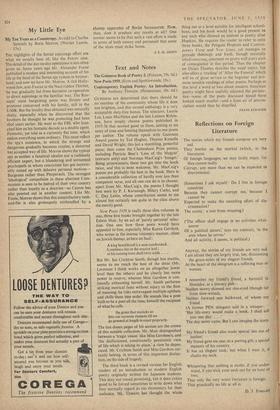Reflections on Foreign Literature
The stories which my friends compose are very sad.
They border on the morbid (which, in the literatures Of foreign languages, we may licitly enjoy, for they cannot really Corrupt, any more than we can be expected to d iscri minate).
(Sometimes I ask myself: Do I live in foreign countries Because they cannot corrupt me, because I cannot be Expected to make the unending effort of dis- crimination?
The exotic: a rest from meaning.) ('The officer shall engage in no activities what- soever Of a political nature,' says my contract, 'in the area where he serves.'
And all activity, it seems, is political.) Anyway, the stories of my friends are very sad. I am afraid they are largely true, too, discounting the grace-notes of my elegant friends.
At the heart of the ideogram is a suffering man or woman.
I remember my friend's friend, a barmaid in Shinjuku, at a literary pub—
Neither snowy-skinned nor sloe-eyed (though far from slow-witted), Neither forward nor backward, of whom my friend (A former PEN delegate) said in a whisper : 'Her life-story would make a book. I shall tell you one day. . .
The day never came: But I can imagine the story.
My friend's friend also made special tics out of leather; My friend gave me one, as a parting gift, a special memory of his country.
It has an elegant look; but when I wear it, it chafes my neck.
Whispering that nothing is exotic, if you under- stand, if you stick your neck out for an hour or two; That only the very worst literature is foreign; That practically no life at all is.
D. J. Ergag.iHT






































 Previous page
Previous page